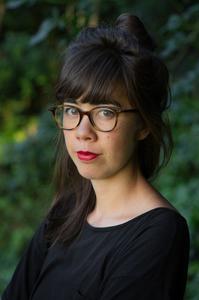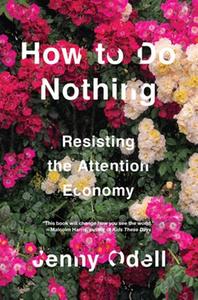
|
|
| photo: Ryan Meyer | |
Jenny Odell is an artist and writer who teaches at Stanford, has been an artist-in-residence at places like the San Francisco dump, Facebook, the Internet Archive and the San Francisco Planning Department, and has exhibited her art all over the world. She lives in Oakland, Calif. How to Do Nothing: Resisting the Attention Economy (Melville House, April 9, 2019) is her first book.
On your nightstand now:
I've got something of a weird combo on my nightstand. Next to a Post-It-flagged copy of Edward J. Balleisen's Fraud: An American History from Barnum to Madoff is Robin Wall Kimmerer's Gathering Moss: A Natural and Cultural History of Mosses. While these may seem unrelated, they're both about paying close attention to devilishly small details. But even if it weren't for that, I've noticed that my mind always knits together the last few things I've encountered; my writing process could be described as "read, sleep, walk." I look forward to seeing what comes of frauds and moss!
Favorite book when you were a child:
I would love to say that my favorite book when I was child was some epic novel or even just a normal book for a child. For instance, I really enjoyed Ray Bradbury's Martian Chronicles and Jostein Gaarder's Sophie's World. But if I were to be totally honest, the book I was obsessed with was a giant tome I found on my parents' shelf: the 1987 edition of the American Medical Association Family Medical Guide. The first section had a bunch of pleasing flowcharts, each starting with different symptoms; I would imaginatively follow them to exciting conclusions like "EMERGENCY!" or "Consult your physician immediately!" The second section had grotesque, full-color photos of skin disorders, and the third section was basically an encyclopedia of everything that can go wrong with the human body. I can't totally account for why I spent so much time poring over this book, but I suspect it was an early interest in cataloguing (which later showed up in my visual art), plus the gross-out factor that kids seem to love.
Your top five authors:
Hannah Arendt, Martin Buber and Walter Benjamin are the thinkers I come back to again and again. For matters ecological and geological, I turn to John McPhee and Aldo Leopold.
Book you've faked reading:
I've only read half of Infinite Jest!
 Book you're an evangelist for:
Book you're an evangelist for:
I find that almost weekly, I recommend Robin Wall Kimmerer's Braiding Sweetgrass: Indigenous Wisdom, Scientific Knowledge, and the Teachings of Plants to someone. I've never read another book like it, and for me it really shows the importance of transdisciplinary work. As both a professor of environmental science and a member of the Citizen Potawatomi Nation, Kimmerer uses two different perspectives on the natural world to illuminate one another in ways that would not otherwise be possible. Her book is not just about the importance of storytelling; her writing itself demonstrates this importance in how beautifully her stories are rendered and woven together.
Book you've bought for the cover:
I once bought a book (in Spanish!) about the birds of Mexico City, because it had this amazing design of birds' heads spiraling into infinity. This is also how I learned that the Spanish name for night heron--one of my favorite birds--literally translates to "water dog."
Book you hid from your parents:
Once, I think when I was about 11, I ordered a "book" from the back section of some magazine (the section with ads for questionable things like drawing contests, weird products, etc.). The book claimed that it contained the secret for "getting any guy to like you," no matter what. I secretly ordered this book and scurried away with it when it came in the mail. To my disappointment, the book was more of a booklet, with almost no cover design and a title in Arial Bold. Its only advice was to never give up, even if the dude says no. Seems like bad advice! I hid this book more out of embarrassment at getting duped than anything else.
Book that changed your life:
I could answer with almost any of the books I've gotten from the excellent ecology section at my local bookstore, Walden Pond. But if I had to pick one, it would be Jennifer Ackerman's The Genius of Birds. Entirely as a result of reading it, I got way into birding, and I also made friends with my neighborhood crows (who I now know are very smart). I now take birding classes, go on birding trips and am frequently late to things because I saw an interesting bird on the way there.
Favorite line from a book:
"If something is boring after two minutes, try it for four. If still boring, then eight. Then sixteen. Then thirty-two. Eventually one discovers that it is not boring at all." --John Cage, Silence
In this same book, I also love "Lecture on Nothing," not just for its content but for its amazing and confounding layout.
Five books you'll never part with:
Susan Buck Morss, The Dialectics of Seeing (about Walter Benjamin; first encountered it in college and have read it several times since)
David Abram, The Spell of the Sensuous: Perception and Language in a More than Human World
Hannah Arendt, The Human Condition (my most-used book!)
Keith Basso, Wisdom Sits in Places
Lawrence Weschler, Seeing Is Forgetting the Name of the Thing One Sees (ostensibly about the artist Robert Irwin, but really about what it means to make art)
Book you most want to read again for the first time:
That would be Frans de Waal's Are We Smart Enough to Know How Smart Animals Are? (Spoiler alert: we aren't.) I suspect that anyone writing about both animal intelligence and human hubris is going to have a good sense of humor, and that is certainly the case with de Waal. I also just love any stories about animal intelligence, so this was a luxurious and delightful read for me.

